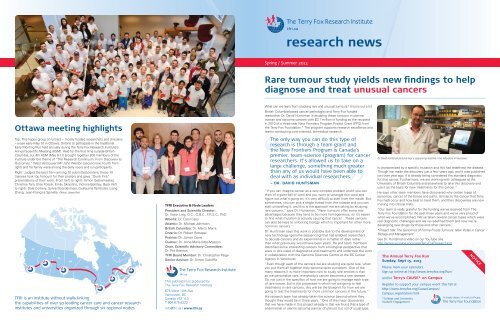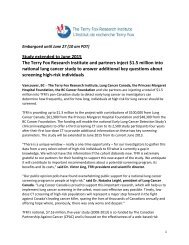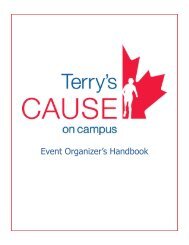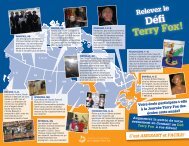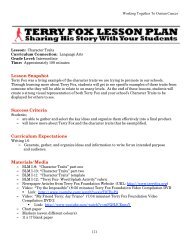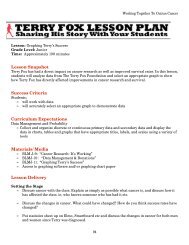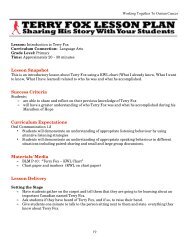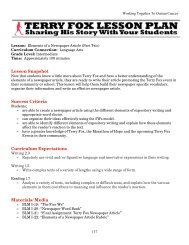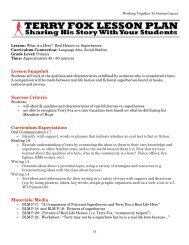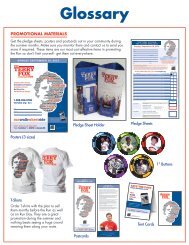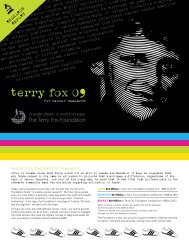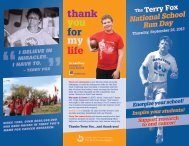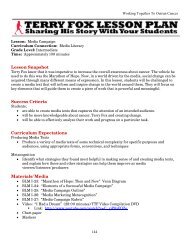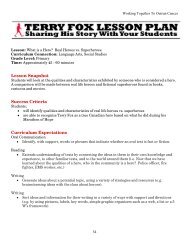TFRI Spring/Summer 2013 Research News Newsletter - Terry Fox ...
TFRI Spring/Summer 2013 Research News Newsletter - Terry Fox ...
TFRI Spring/Summer 2013 Research News Newsletter - Terry Fox ...
You also want an ePaper? Increase the reach of your titles
YUMPU automatically turns print PDFs into web optimized ePapers that Google loves.
tfri.ca<br />
research news<br />
<strong>Spring</strong> / <strong>Summer</strong> <strong>2013</strong><br />
Rare tumour study yields new findings to help<br />
diagnose and treat unusual cancers<br />
What can we learn from studying rare and unusual tumours It turns out a lot.<br />
British Columbia-based cancer pathologist and <strong>Terry</strong>-<strong>Fox</strong> funded<br />
researcher Dr. David Huntsman is studying these tumours in uterine,<br />
ovarian and sarcoma cancers with $3.1 million in funding as the recipient<br />
in 2010 of a three-year New Frontiers Program Project Grant (PPG) from<br />
the <strong>Terry</strong> <strong>Fox</strong> Foundation.* The program supports research excellence and<br />
teams conducting cure-oriented, biomedical research.<br />
Ottawa meeting highlights<br />
Top: This happy group of runners -- mostly funded researchers and clinicians<br />
– arose early May 10 in Ottawa, Ontario to participate in the traditional<br />
Early Morning Run held annually during the <strong>Terry</strong> <strong>Fox</strong> <strong>Research</strong> Institute’s<br />
Annual Scientific Meeting (ASM). Held for the first time outside British<br />
Columbia, our 4th ASM (May 9-11) brought together 200 members of the<br />
Institute under the theme of “The <strong>Research</strong> Continuum: From Discovery to<br />
Outcomes.” West Vancouver MP John Weston (second row, fourth from<br />
right) and his family were among the early risers and run participants.<br />
Right: Judged the best from among 70 submitted posters, these 10<br />
trainees took top honours for their posters and gave “Quick Fire”<br />
presentations of their work. Front (left to right): Simon Gebremeskel,<br />
Christine Tam, Elite Possik, Emily Skrastins, Victoria Bentley. Back (left<br />
to right): Dale Corkery, Sylvie Noordermeer, Guillaume Tambutet, Liang<br />
Zhang, Jean-François Spinella. Photos: James Park<br />
BC<br />
AB<br />
SK<br />
MB<br />
<strong>TFRI</strong> is an institute without walls linking<br />
the capabilities of over 50 leading cancer care and cancer research<br />
institutes and universities organized through six regional nodes.<br />
ON<br />
QC<br />
NB<br />
PEI<br />
NS<br />
NL<br />
<strong>TFRI</strong> Executive & Node Leaders<br />
President and Scientific Director:<br />
Dr. Victor Ling, O.C., O.B.C., F.R.S.C., PhD<br />
Alberta: Dr. Carol Cass<br />
Atlantic: Dr. Michael Johnston<br />
British Columbia: Dr. Marco Marra<br />
Ontario: Dr. Robert Rottapel<br />
Prairies: Dr. James Davie<br />
Quebec: Dr. Anne-Marie Mes-Masson<br />
Chair, Scientific Advisory Committee:<br />
Dr. Phil Branton<br />
<strong>TFRI</strong> Board Member: Dr. Christopher Paige<br />
Senior Advisor: Dr. Simon Sutcliffe<br />
tfri.ca<br />
This publication is produced by<br />
The <strong>Terry</strong> <strong>Fox</strong> <strong>Research</strong> Institute.<br />
675 West 10th Ave<br />
Vancouver, BC<br />
Canada V5Z 1L3<br />
T 604.675.8222<br />
info@tfri.ca | www.tfri.ca<br />
The only way you can do this type of<br />
research is through a team grant and<br />
the New Frontiers Program is Canada’s<br />
premier, team-science (program) for cancer<br />
researchers. It’s allowed us to take on a<br />
large challenge, something much greater<br />
than any of us would have been able to<br />
deal with as individual researchers.<br />
– Dr. DAVID HUNTSMAN<br />
“If you can imagine cancer as a very complex problem and if you can<br />
think of a giant ball of wool and you want to untangle this wool and<br />
figure out what’s going on, it’s very difficult to start from the inside. But,<br />
sometimes, you can pick a single thread from the outside and you can<br />
start unravelling it, and this is the approach we are taking by studying<br />
rare cancers,” says Dr. Huntsman. “Rarer tumours offer some real<br />
advantages because they tend to be more homogeneous, so it’s easier<br />
to find what mutation is actually causing that cancer…These cancers<br />
can also be keys to unlocking biology which is important for other more<br />
common cancers.”<br />
Dr. Huntsman says this work is possible due to the development of<br />
new technology (genome sequencing) that has enabled researchers<br />
to decode cancers and do experiments in a matter of days rather<br />
than what previously would have been years. He and team members<br />
identified some interesting cancers from a biological perspective that<br />
were in dire need of diagnostics and treatments and undertook the work<br />
in collaboration with the Genome Sciences Centre at the BC Cancer<br />
Agency in Vancouver.<br />
“Even though each of the cancers we are studying are quite rare, when<br />
you put them all together they become quite a problem. One of the<br />
many reasons it is more important now to study rare entities is that<br />
as we personalize care, everybody’s cancer becomes a rare disease.<br />
So, not just in the specifics of how we are going to manage each type<br />
of rare cancer, but in the processes in which we are going to test<br />
treatments in rare cancers, this will be the blueprint for how we are<br />
going to test the treatments for more common cancers in the future.”<br />
His research team has already taken the science beyond where they<br />
thought they would be in three years. “One of the major discoveries<br />
that we have made in this project already is that we found that a type of<br />
endometrial or uterine sarcoma (cancer of uterus), but not of usual type,<br />
Dr. David Huntsman pictured near a sequencing machine in his laboratory in Vancouver.<br />
is characterized by a specific mutation and this has redefined the disease.<br />
Though we made the discovery just a few years ago, and it was published<br />
just over year ago, it is already being considered the standard diagnostic<br />
for that cancer. Furthermore, we are working with colleagues at the<br />
University of British Columbia and elsewhere to take this discovery and<br />
use it as the basis for new treatments for this cancer.”<br />
He says other team members have discovered why certain types of<br />
sarcomas, cancer of the bones and joints, (similar to the cancer that <strong>Terry</strong><br />
<strong>Fox</strong> had) occur and how best to treat them, and their discoveries are now<br />
moving into clinical trials.<br />
“Our team is really grateful for the funding we’ve received from The<br />
<strong>Terry</strong> <strong>Fox</strong> Foundation for the past three years and we’re very proud of<br />
what we’ve accomplished. We’ve taken several cancer types which were<br />
real diagnostic challenges and we’ve redefined them and now we’re<br />
developing new drugs for those and other cancers.”<br />
*Project title: The Genomics of Forme Fruste Tumours: New Vistas in Cancer<br />
Biology and Management<br />
See Dr. Huntsman’s video on our YouTube site:<br />
http://www.youtube.com/user/<strong>Terry</strong><strong>Fox</strong><strong>Research</strong>Inst<br />
The Annual <strong>Terry</strong> <strong>Fox</strong> Run<br />
Sunday, Sept 15, <strong>2013</strong><br />
Please mark your calendars.<br />
Sign up online at http://www.terryfox.org/Run/<br />
and/or <strong>Terry</strong>’s CAUSE* on Campus<br />
Register to support your campus event this fall at<br />
http://www.terryfox.org/CauseCampus/<br />
Campus_registration.html<br />
*College and University<br />
Student Engagement<br />
NOTICE<br />
<strong>TFRI</strong>_<strong>News</strong>letter_1305.indd 1-2<br />
13-06-14 12:47 PM
<strong>TFRI</strong> and the Saskatchewan Health<br />
<strong>Research</strong> Foundation fund fellowship<br />
at University of Saskatchewan<br />
Talented and newly funded investigators<br />
study cancer genetics, growth and treatment<br />
<strong>TFRI</strong> and the Saskatchewan Health <strong>Research</strong> Foundation (SHRF) have<br />
announced Dr. Ayman Mohammad as the first recipient of the <strong>Terry</strong><br />
<strong>Fox</strong> Post-doctoral Fellowship held at the University of Saskatchewan’s<br />
College of Pharmacy and Nutrition. This partnered fellowship brings<br />
a top-notch new scientist to Saskatchewan, adding capacity there to<br />
tackle the cancer challenge.<br />
The award, won in a highly competitive process, provides $50,000 a year<br />
for two years, allowed Dr. Mohammad to come from overseas to conduct<br />
his leading-edge work in Saskatoon, alongside Dr. Azita Haddadi, his<br />
fellowship supervisor.<br />
This fellowship supports research excellence<br />
and connects Dr. Mohammad to a national<br />
team of top researchers across Canada<br />
who, through funding from the <strong>Terry</strong> <strong>Fox</strong><br />
Foundation,work collaboratively on finding<br />
solutions for understanding, diagnosing and<br />
treating cancer. – Dr. VICTOR LING<br />
health research careers and research productivity. Our partnership with<br />
<strong>TFRI</strong>, its community of cancer researchers and broader community<br />
of survivors, patients and families, provides a unique environment for<br />
this promising research.” SHRF is the provincial agency that funds and<br />
facilitates health research in Saskatchewan.<br />
Conventional cancer treatments often fail, leading to tumour recurrence.<br />
This may be due to an inability of patients’ immune systems to recognize<br />
cancer cells as something to attack. Hence, cancer vaccines must be<br />
specially designed to stimulate the immune system against cancer. Dr.<br />
Mohammad is exploring the use of polymeric nanoparticles as a better<br />
way of doing that. These biodegradable particles are attracting scientific<br />
attention as potential drug-delivery devices, with a role in targeting<br />
specific tissues. Dr. Mohammad’s goal is to generate sufficient evidence<br />
to begin testing the approach in human trials.<br />
Three exciting young researchers – two in Ontario and one in British<br />
Columbia – have been awarded a total of nearly $1.35 million under the<br />
<strong>Terry</strong> <strong>Fox</strong> Foundation’s New Investigator Awards (2012). The awards are<br />
for three years and commenced in November 2012.<br />
The <strong>Terry</strong> <strong>Fox</strong> Foundation has supported top new investigators for more<br />
than 30 years. A review committee of international scientific experts<br />
determines recipients from a pool of talented applicants in a competitive<br />
process. Every year, applications are submitted by Canada’s best new<br />
researchers and those determined to be the best are selected.<br />
A new feature of the competition in recent years is the pairing of award<br />
recipients with scientists recognized in their fields and who are working<br />
on <strong>Terry</strong> <strong>Fox</strong>-funded discovery or translational research projects. New<br />
investigators are matched with funded programs and supported by<br />
principal investigators* who have committed to mentoring them and<br />
incorporating them into their research teams.<br />
*PI=principal investigator<br />
We thank the Saskatchewan Health <strong>Research</strong> Foundation and our<br />
supporters in Saskatchewan who participate in our annual school and<br />
community runs to raise money to make research possible in important<br />
areas like the one Dr. Mohammad is studying – cancer vaccines and<br />
immunotherapy,” said Dr. Victor Ling, <strong>TFRI</strong> President and Scientific Director.<br />
“We are very pleased to have a researcher of Dr. Mohammad’s caliber<br />
receive this award,” said June Bold, SHRF chief executive officer.<br />
“SHRF’s Postdoctoral <strong>Research</strong> Fellowship Program aims to advance<br />
Dr. Ayman Mohammad at the University of Saskatchewan. Photo credit: Debra Marshall<br />
<strong>TFRI</strong> partners with Taiwan Science Council<br />
This spring scientists at the National Science<br />
Council of Taiwan (NSC) and the <strong>Terry</strong> <strong>Fox</strong><br />
<strong>Research</strong> Institute (<strong>TFRI</strong>) embarked on studies<br />
in three specific areas of cancer research as<br />
part of an international scientific collaboration<br />
reached between them.<br />
This is the first collaboration entered into by the<br />
two parties, paving the way for scientists in both<br />
countries to conduct research together for the<br />
first time in areas of relevance and expertise.<br />
“This intellectual collaboration brings together<br />
the brightest minds from both countries,<br />
strengthens the linkages between the best<br />
research organizations in both countries,<br />
and jointly honours the memory and spirit of<br />
<strong>Terry</strong> <strong>Fox</strong>,” said <strong>TFRI</strong> president and scientific<br />
director Victor Ling.<br />
The Memorandum of Understanding signed<br />
in November 2012 supports scientific<br />
collaborations between our scientists valued<br />
at up to $2.5 million over a period of five<br />
years. Each country is funding their scientists<br />
participating in the projects.<br />
Following is a breakdown of the research teams<br />
and projects:<br />
• Leukemia is a cancer of the blood system<br />
where there is rapid growth of abnormal white<br />
blood cells that accumulate in the bone marrow.<br />
Drs. Keith Humphries and Aly Karsan (BC<br />
Cancer Agency) and Professor Hwei-Fang Tien<br />
and colleagues at the National Taiwan University<br />
Hospital will share unique resources on each<br />
side to better understand a particular genetic<br />
mutation that is found in around 10 percent of<br />
Taiwanese patients with acute myeloid leukemia<br />
(AML). These research teams hope to develop<br />
new diagnostic tests to identify those patients<br />
who generally succumb to AML earlier, and who<br />
desperately need better treatments.<br />
• Lung cancer. This project will study clinically<br />
significant differences in patients with lung<br />
cancer living in Taiwan and Canada. Dr. Stephen<br />
Lam (BC Cancer Agency )will collaborate with<br />
Dean Pan-Chyr Yang of the National Taiwan<br />
University Medical College on a number of<br />
connected studies. The Canadian team has<br />
developed a series of early lung cancer detection<br />
tests which will be tested on patients in Taiwan<br />
while researchers in Taiwan have identified a<br />
number of interesting genetic markers to detect<br />
lung cancer. These teams will share techniques<br />
and test new methods to detect lung cancer at<br />
an earlier, more treatable stage.<br />
• Two projects in liver cancer are being supported.<br />
» Dr. John Bell (Ottawa Hospital <strong>Research</strong><br />
Institute) and Professor Pei-Jer Chen at the<br />
National Taiwan University College of Medicine<br />
will study the use of a novel therapeutic<br />
approach called oncolytic viruses (from Canada)<br />
to treat liver cancer in the woodchuck (from<br />
Taiwan). This group hopes to better understand<br />
how the novel therapy works and to find<br />
biomarkers to help detect liver cancer earlier.<br />
» Dr. François Benard (BC Cancer Agency) will<br />
collaborate with Professor Kai-Yuan Tzen of the<br />
National Taiwan University Hospital (NTUH) to<br />
produce and compare two promising Positron<br />
Emission Tomography imaging agents in liver<br />
cancer patients at BCCA and at NTUH to help<br />
doctors decide which procedure will help them<br />
to more effectively diagnose liver cancer.<br />
DR. REBECCA AUER<br />
Where: Ottawa Hospital <strong>Research</strong> Institute<br />
Project Title: A Personalized Oncolytic Vaccine: Using<br />
Oncolytic Viruses to Exploit Neo-Antigens Derived<br />
from the Tumour Mutanome<br />
Award: $450,000<br />
Mentoring Program: TFF-PPG: Canadian Oncolytic<br />
Virus Consortium (Dr. John Bell, PI*)<br />
Dr. Auer, a surgical oncologist at the Ottawa<br />
Hospital and University of Ottawa assistant<br />
professor, is developing a personalized<br />
vaccine that is combined with a cancerfighting<br />
virus. The immune system is very<br />
good at killing unwanted invaders, like<br />
viruses, and can be very effective at killing<br />
cancer cells once it recognizes these as<br />
foreign. Introducing the vaccine via the virus<br />
will allow the immune system to mount a<br />
powerful response against both the virus and<br />
the cancer itself. This vaccination strategy<br />
has all the strength of a viral vaccine but will<br />
pinpoint specific mutations found only within<br />
a given patient’s cancer.<br />
“As a cancer surgeon I am particularly<br />
interested in preventing cancer from coming<br />
back after cancer surgery and in this project I<br />
will use the vaccine around the time of surgery<br />
to prevent cancer recurrences,” says Dr. Auer.<br />
Dr. Duncan Stewart, scientific director of the<br />
Ottawa Hospital <strong>Research</strong> Institute, says:<br />
“Dr. Auer has shown extraordinary initiative<br />
in forging links between her laboratory and<br />
clinical colleagues. She has an excellent mix<br />
of innovation, drive and practicality that allows<br />
her to flourish in the challenging career path<br />
of a clinician-scientist.”<br />
DR. SOHRAB SHAH<br />
Where: BC Cancer Agency<br />
Project Title: Are Genomic Instability and Clonal<br />
Diversity Prognostic Indicators of High Grade<br />
Serious Ovarian Cancer<br />
Award: $449,503<br />
Mentoring Program: <strong>TFRI</strong>’s Pan-Canadian Platform<br />
for the Development of Biomarker-Driven Subtype-<br />
Specific Management of Ovarian Carcinoma<br />
(COEUR). (Dr. Anne-Marie Mes-Masson, PI)<br />
Dr. Shah is an assistant professor at the<br />
University of British Columbia and a scientist<br />
with the BC Cancer Agency in Vancouver. He<br />
is studying the question of whether instability<br />
and diversity in ovarian cancer genes can help<br />
predict which patients will relapse versus which<br />
will respond to chemotherapy and live longer.<br />
“The genetic make-up of high-grade serous<br />
carcinomas varies from tumour to tumour,”says<br />
Dr. Shah. “Within the same tumour, populations<br />
of cells can be very different from one another.<br />
Our research group recently observed that there<br />
are, in fact, global patterns of diversity that exist<br />
among this group of tumours.”<br />
Dr. Shah’s research will study how tumours<br />
evolve and why some have this diversity,<br />
potentially pointing the way to new avenues for<br />
treating the disease and avoiding relapse.<br />
Dr. David Huntsman, medical director at the BC<br />
Cancer Agency’s Centre for Translational and<br />
Applied Genomics (CTAG), says, “Having Sohrab<br />
in our research community will empower cancer<br />
researchers in British Columbia to be leaders<br />
in genomic and other data-intensive research<br />
activities for years to come.”<br />
Dr. Gelareh Zadeh<br />
Where: University Health Network<br />
Project Title: Exploring Novel Mechanisms of Tumour<br />
Vascularization in Malignant Brain Tumours<br />
Award: $449,899<br />
Mentoring Program: TFF-PPG: <strong>Terry</strong> <strong>Fox</strong> Program:<br />
Genetic Analysis of Signalling Pathways for Vascular<br />
Development and Tumour Angiogenesis<br />
(Dr Andras Nagy, PI)<br />
A neurosurgeon and scientist with Toronto’s<br />
University Health Network, Dr. Zadeh is<br />
studying how cancerous tumours in the brain<br />
create their own blood supply and blood vessel<br />
network from bone marrow cells. She proposes<br />
to use live imaging to see how tumours grow<br />
blood vessels and how they respond to therapy.<br />
“Our research focuses on the role of progenitor<br />
cells derived from the bone marrow that can<br />
help form new blood vessels or provide a<br />
supportive role to the existing tumour blood<br />
vessels,” she says. <strong>Research</strong> results will<br />
identify ways that cancer cells trigger new<br />
vessel formation.<br />
“I think the exciting aspect of the research is that<br />
it is an entirely new way of looking at how blood<br />
vessels form in tumours, which can provide asyet-unexplored<br />
methods of blocking blood supply<br />
to the brain tumours,” says Dr. Zadeh.<br />
Dr. Hao Ding at the University of Manitoba’s<br />
Faculty of Medicine says Dr. Zadeh is “well<br />
on her way to becoming a recognized<br />
independent successful researcher in the field<br />
of brain cancer angiogenesis. Her ability as<br />
a neurosurgeon to translate her findings into<br />
clinical practice places her at an extremely<br />
unique and desirable position.”<br />
<strong>TFRI</strong>_<strong>News</strong>letter_1305.indd 3-4<br />
13-06-14 12:47 PM


